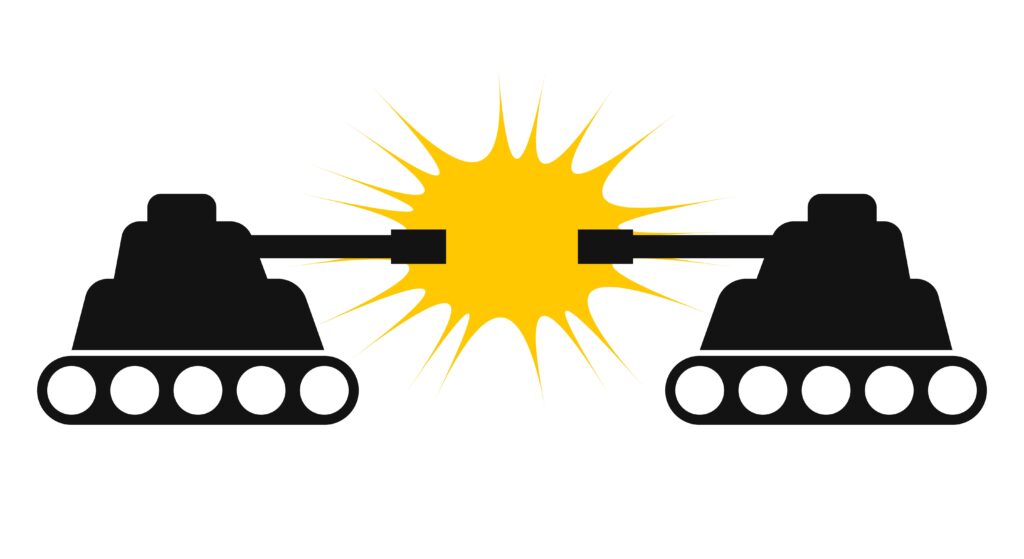
If you want to improve your vocabulary in English, one of the best things you can do is to study the most common prefixes and suffixes for English words. Knowing what they mean will not only help you to remember more words, but it will also give you the ability to guess the meanings of words that you have not seen before.
Today I am going to talk about the difference between two prefixes, “anti-” and “counter-.” Both of them are used to make negative words, and there is some overlap in their meanings, but there are also some subtle differences.
The meanings of “anti-”
“Anti-” can be attached to nouns and adjectives. In some cases, it can be attached to entire phrases. I will cover five different senses of “anti-” that are common in modern English. They are:
- ‘an alternative to’ or ‘a rival of.’ Some examples are “antichrist” and “antipope.” An “antipope” is a person who claims to be the pope (the leader of the Catholic Church) but is not. An antipope is a rival to the true pope.
- ‘opposed to the expected form of.’ An example is an “antihero.” This is a person who plays a central character that we normally expect from a hero, but who lacks the positive characteristics that we associate with a hero. An “antihero” is not the hero we expected to see.
- ‘the reverse of.’ This sense is used in physics in words like “antimatter” or “antiproton.” When a proton collides with an antiproton, they destroy each other.
- ‘opposed to’ or ‘opponent of.’ Examples of this sense are often used in politics. A person who is “antiwar” is opposed to war. A person who is opposed to capitalism is an “anticapitalist.” The opposite of this sense of “anti-” is “pro-”. “Probusiness” would be to support business, while “antibusiness” would be to oppose business.
- ‘used against, inhibits or neutralizes.’ An example is an “anti-aircraft gun.” This is a gun that is used for fighting against aircraft. There are many examples from medicine. An “antibacterial soap” is a type of soap that kills bacteria. Beauty products often claim that they are “antiwrinkle.” They claim to stop your skin from developing wrinkles.
“Anti-” is originally from Greek. It should not be confused with the prefix “ante-”, (spelled a-n-t-e), which is from Latin and means “before.”
The meanings of “counter-”
“Counter-” can be attached to verbs, nouns, and adjectives. “Counter-” comes from Old French. There are three different senses of the prefix “counter-” that are common in modern English. They are:
- ‘to do an opposing action of a similar type.’ An example is “counter-revolution.” Imagine that you have a government that came to power because of a revolution. A group of people who do not support the government start another revolution to destroy and replace the current government. This is a counter-revolution. It is a revolution that opposes another revolution. Another example is “counterattack.” If an army is attacked, they will respond with an attack of their own.
- ‘to be in an opposite position.’ An example is “countersign.” One person signs a document, and then another person signs the same document on the opposite side of the page. Another example is “counterbalance.” If two children are playing on a seesaw, the weight of one child counterbalances the other.
- ‘to be the opposite of what is expected.’ An example is “counterproductive.” When an action is counterproductive, it produces the opposite result from what was expected. Imagine that a government raises the tax on alcohol to discourage people from drinking. If the result is an increase in illegal alcohol sales, then the tax was counterproductive. It not only did not produce the desired result, but it also produced a different and undesired result.
Comparisons
Now, let’s compare the two prefixes. Where can the meanings of “anti-” and “counter-” overlap? One example is with the words “counterclockwise” and “anticlockwise.” The first is more common in North America, and the second is more common in British English. The meaning of the two words is the same. They mean movement in the opposite direction of a clock’s hands. In this case, both prefixes mean “the opposite of something.”
Despite the overlap in “counterclockwise” and “anticlockwise,” do not assume that these prefixes are interchangeable.
Let’s examine how “anti-” and “counter-” change the same word. If I attach these prefixes to the word “revolutionary,” the meanings are not the same. “Antirevolutionary activity” would involve stopping revolutionary activity. For example, if a government stopped people from gathering in large groups to protest, that would be antirevolutionary. The government is trying to stop or inhibit revolutionary activity. This is different from “counter-revolutionary activity.” An example of counter-revolutionary activity would be violent action against a government that came to power because of a revolution. It is opposing one revolution with a different one.
Conclusion
To recap, “anti-” can be attached to nouns and adjectives. In some cases, it can be attached to entire phrases. “Counter-” can be attached to verbs, nouns, and adjectives. While dictionaries will show the meaning of both prefixes as “the opposite of (something),” there can be a subtle difference between their meanings. “Anti-” can have an idea of stopping, inhibiting, or neutralizing something. “Counter-” does not. In physics, when a proton collides with an antiproton, they destroy each other. “Counter-” can have an idea of conflict between opposing forces of a similar type. A counter-revolution is an opposing revolution that comes in conflict with an earlier revolution.
References
Dixon, R. M. W. (2014) Making New Words: Morphological Derivation in English, Oxford, United Kingdom: Oxford University Press, pp. 238-239.
“Anti-, Prefix.” Oxford English Dictionary, Oxford UP, accessed March 2025, https://doi.org/10.1093/OED/4384334894.
“Anti-, Prefix.” Wiktionary, accessed March 2025, https://en.wiktionary.org/wiki/anti-.
Would you like to support my content? Make a donation at Buy me a Coffee!
Get notified of new blog posts on my Telegram channel. Sign up at https://t.me/diffengexplnd.
